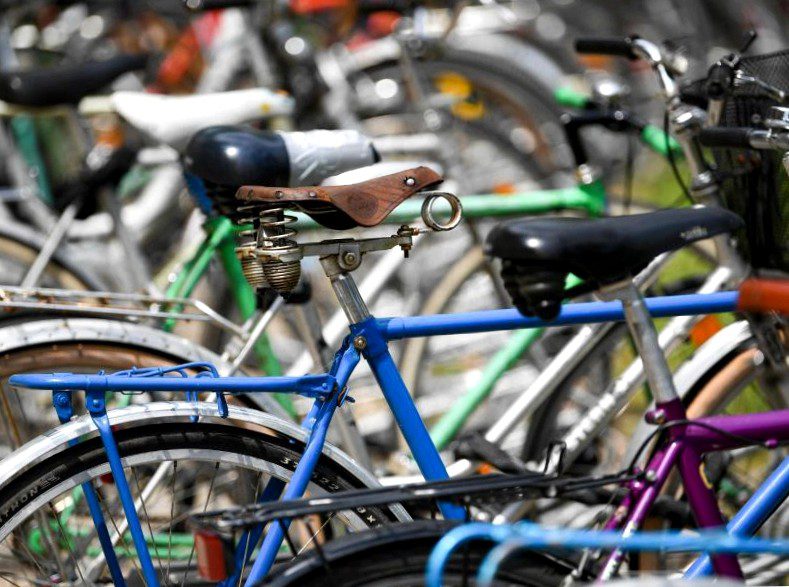
Traffic jams in leipzig's karl-liebknecht-strabe from late afternoon onwards. But that's not because of the traffic, but because of the long lines of people in front of the bike department east.
"Land under," is how bike store owner gerd may describes the situation since the store's reopening on the 20th. April. Because of the distance and hygiene regulations, a maximum of 20 customers were allowed to be in the shop at the same time, so one had to be patient when buying a bicycle. "Now all those come who had been there without corona since march," says the boss of 25 employees who now work with mouth-nose protection.
March and april are the most important months for the branch, comparable to christmas in the rest of the trade. This year, however, the corona crisis spoiled the start of the season: the immediate effects of disrupted supply chains and closed stores during the shutdown were also severe in the bicycle industry, explains the association of the german two-wheeler trade. According to the corona, the sales drop was between 30 and 60 percent. Now, however, a race to catch up can be observed everywhere.
"We are currently seeing an enormous run on the bicycle shop. Without wanting to talk about a winner of the crisis, it must be said that the bicycle is currently experiencing a special moment," confirms david eisenberger, head of marketing and communications at the bicycle industry association, which represents about 100 companies in the bicycle industry.
In addition to those who had planned to buy a new bike anyway, there are also many customers who have rediscovered the bike for themselves. This is demonstrated not least by the increased demand in the entry-level segment starting at 300 euros.
The branch has been in the auind for a long time. Last year, it generated a good 4.2 billion euros in sales with bicycles and especially the increasingly popular e-bikes – 34 percent more than the year before. In addition, consumers tended to prefer higher quality bicycles, according to eisenberger. The average price across all sales channels in 2019 was 982 euros, around one-third higher than in 2018. Nationwide, around 280,000.000 people work in the bicycle industry.
The extent to which the manufacturers were able to compensate for the partial standstill in production over a period of up to eight weeks is not foreseeable. Despite the painful bumps at the start of the season, they are now optimistic that they will get off lightly. However, a second wave of infection and thus a renewed shutdown of production and trade remains a risk.
At the traditional manufacturer diamond in hartmannsdorf, saxony, production is carried out in compliance with minimum distances and numerous other hygiene tests. Production at the plant, which employs 500 people, has not been completely suspended, but short-time working has been announced. "We have reduced output and were naturally also affected by disrupted supply chains from asia", reports manager thomas eichentopf.
He sees the trend toward two-wheelers reinforced by corona: "we're experiencing a mini-bike boom right now."The company, which has been on the market for 135 years, has never paid for as many searches on its website as it did in april.
The e-bike supplier pendix from zwickau in saxony also reports very high demand. "The bike is a huge winner at this time," says managing director thomas herzog. Together with four friends, the automotive engineer developed a retrofittable electric drive for bicycles. At the start of 2013, they were still laughed at for this. According to its own information, pendix is now the market leader in this segment, and according to the ZIV, the best-known aftermarket manufacturer.
In view of the regulations for public transport – such as the requirement to wear a mask – bicycles with an electric tailwind have many advantages. Even the german automobile association (ADAC) assumes that bicycles will gain in importance alongside cars for individual transport.
But whether it will actually be the winner in the end depends above all on the infrastructure, according to the verbund service und fahrrad, which also represents the specialist trade. "Infrastructure is the key to success," says managing director albert herresthal. Quick fixes like the "pop-up bike lanes" in berlin had to remain in place permanently.
The general german bicycle club (adfc) also praises the idea of creating bike lanes virtually overnight with the help of construction site beacons and colored stripes. Dusseldorf now also wants to follow suit, says ADFC spokeswoman stephanie krone. The most important consumer association for cyclists fears "an unimagined flood of car traffic" after the end of the contact restrictions, if many people prefer to get back into their cars because of the restrictions in the opnv. According to the report, the people of bundesburg made around 32 million trips by bus, streetcar or train in 2019. Per day, mind you. If only a fraction of this is driven by car again, there is a risk of a super traffic jam.
Instead of sending the wrong signal with a car pramie now, car traffic must finally make room for bicycles and, if at all, a mobility pramie for all must be launched – the associations surveyed agree on that.